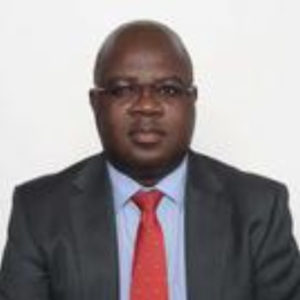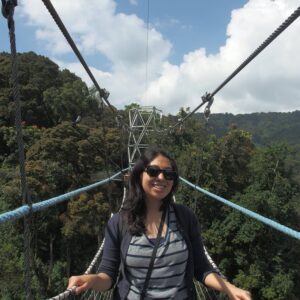Nelson Gapare – Director
 Nelson is a founding director of Greensoft GMC. With an academic background in forestry, environmental policy and resource management, business management focusing on opportunities from climate change, he has over 20 years of working experience in the key sectors of forestry, agriculture, natural resource management and climate change/REDD+. He also has a technical background in geospatial technology, remote sensing, and project management, with a full understanding of thematic areas such as MRV.
Nelson is a founding director of Greensoft GMC. With an academic background in forestry, environmental policy and resource management, business management focusing on opportunities from climate change, he has over 20 years of working experience in the key sectors of forestry, agriculture, natural resource management and climate change/REDD+. He also has a technical background in geospatial technology, remote sensing, and project management, with a full understanding of thematic areas such as MRV.
Nelson has worked in both the private sector and government, with extensive experience in many parts of Africa, South East Asia, South America and Australasia. Nelson has been awarded a Master in Business Administration degree (MBA) from Massey University (New Zealand), a Postgraduate Diploma in Resource Studies from Lincoln University (New Zealand), and a Diploma in Forestry Management from the Zimbabwe College of Forestry.
Nelson is continuously involved in reviews and evaluations of climate change and natural resource management projects, programmes, and initiatives. Some recent reviews have been undertaken in Lao People’s Democratic Republic (Lao PDR), Vietnam, Cambodia, Tanzania, Zambia, Zimbabwe, Uganda, Indonesia, Papua New Guinea and Bhutan. Nelson’s experience in evaluating UN-REDD programmes includes leading teams to undertake final evaluations of the national programs in Tanzania, Cambodia, Papua New Guinea, Zambia, and Uganda. In Tanzania, he also led a team to undertake a gap analysis of REDD+ Readiness. This involved providing strategic advice on the priorities that could be considered to enable the country to be ready for a performance-based REDD+ regime.
At the programme implementation level, Nelson has held leadership roles in implementing national and subnational projects including bilateral and multilateral REDD+ readiness and emission reductions programs in various countries, including Lao PDR and Bhutan. He has been involved in programme reviews and evaluations for various multi-lateral institutions such as UNDP/GEF, FAO, the World Bank, the European Commission, Ministry of Foreign Affairs of Norway and other development agencies. He recently completed mid-term reviews for UNDP/GEF in Tanzania and for the Forest Carbon Partnership Facility in Cambodia, Lao PDR, and Bhutan. He has also been a lead advisor in multi-year appraisals to estimate the market value of GFP BioCarbon’s interest in six carbon project investments. Three of the projects are Improved Cookstove (ICS) projects implemented in Ghana, Nigeria and Malawi under the Clean Development Mechanism; two projects involve avoided deforestation projects in Peru and Zambia under the Voluntary Carbon Standard. The sixth project was a forest regeneration program in Australia, implemented under the Carbon Farming Initiative.
Nelson was a programme leader and manager of the team that successfully implemented New Zealand’s National Land Use and Carbon Analysis System (LUCAS) and the subsequent successful in-country review of the New Zealand 2008 GHG Inventory Report, as part of meeting international obligations under the Kyoto Protocol.
Steve Long – Associate Director
 Steve has over twenty years’ experience working in the environmental field, having worked in both governmental and private sectors. He has been awarded a Master Environmental Management degree from Bradford University (UK) and a Master in Business Administration degree (MBA) from the University of London, bringing together his strong interest in the circular economy. Steve has been working for Greensoft GMC for a number of years, bringing his broad knowledge of the environment, business acumen, strong report writing skills and organisational management.
Steve has over twenty years’ experience working in the environmental field, having worked in both governmental and private sectors. He has been awarded a Master Environmental Management degree from Bradford University (UK) and a Master in Business Administration degree (MBA) from the University of London, bringing together his strong interest in the circular economy. Steve has been working for Greensoft GMC for a number of years, bringing his broad knowledge of the environment, business acumen, strong report writing skills and organisational management.
Steve spent ten years working for the New Zealand Ministry for the Environment in a range of positions, including Manager of Communications and Manager of the Environmental Grants Programme. During this latter role he was responsible for the administration of 30 million dollars of annual funding towards climate change, waste management, biodiversity protection, and general environmental projects. Steve also spent two years working in the office of the Minister for the Environment as Private Secretary. In this position he was responsible for providing advice across the portfolio, including resource planning, freshwater management, climate change, biodiversity, air quality, waste, agriculture, international commitments and environmental reporting.
Steve’s earlier career was focused on biodiversity conservation, with responsibilities for the management of a range of internationally protected areas in the UK. His work included the production of conservation strategies, management plans and ecological surveys. He also managed a habitat enhancement programme, and received a number of national awards for his design and construction of new wetlands in the London area.
In more recent years Steve has been working as a consultant on a range of projects and programmes, in various locations throughout the world. This has included development work in south-east Asia, helping sustain livelihoods in areas prone to flooding. During the past three years he has also been contracted to a number of private waste management companies to provide business planning, marketing, project management, and financing advice. Through his broad environmental technical knowledge, experience of managing funding programmes, and understanding of government processes, Steve has successfully obtained over $20 million of funding for a range of recycling infrastructure and service projects within New Zealand.
In Steve’s spare time, he enjoys travelling to exotic and sometimes cold places, with his favourite being the Himalayas. Steve has been climbing mountains since he was four year’s old and enjoys undertaking extreme multi-day hikes, although his knees are starting to get a bit grumpy! Steve is also a passionate musician and plays lead guitar in a number of rock and blues cover bands, although he states that the majority of his music is pre-1980 and knows little modern music!
Dr Silencer Mapuranga – Senior Associate

Dr. Silencer Mapuranga joined GMC in late 2019 to support the GMC technical team that is providing technical assistance to governments, private sector and the global community that is addressing the urgent challenge of the climate change: having spent 27 years at the forefront of providing technical assistance to the private sector in international business and partnership development. His work drew financing and collaboration with several UN partners in related trade and investment projects ( FAO; ITC; UNDP; UNCTAD, UNIDO, UNEP; UNICEF; UNWOMEN; WFP; AfDB, World Bank).
Between 2002 and 2018 he designed and implemented UN programmes to support trade/investment and export development in Least Developed Countries: work spans Africa, Asia and the Caribbean region. These projects injected a private sector thrust in projects that targeted achievement of some of the SDGs, and they were adequately financed by the EU’s country and regional programmes, World Bank, DfID, GIZ, Private Banks, and the UK based Commonwealth Secretariat. Responsibilities included operations, results-based management, capacity building, inter-agency coordination, and collaboration with the leading private sectors, civil society, and playing a critical role in fund raising for project implementation.
Silencer led and coordinated technical assistance teams implementing special projects for building private sector competitiveness in product and market development, trade intelligence and information exchange. This technical assistance supported businesses to integrate into global value chains and also prepare them to take advantage of the larger internal market of Africa’s Continental Free Trade Area. Joint projects were implemented as technical support to the program priorities of three (3) African regional blocs (COMESA, ECOWAS, SADC): Market Integration (Trade Facilitation), Industrialization and Cluster Development (in agriculture value chains), Scaling up action plans for Climate-Smart Agriculture , Private Sector Development (Public-Private Dialogue (PPD) for improved business climate, improved Trade in Services and related regulatory reforms, creating awareness of Green Bonds financing of strategic industries. Mechanism were established for (i) Working Groups to deliver policy guidance at policy levels and at intra-industry strategy design and implementation; (ii) organized buyer-seller meetings and participation in green trade fairs and co-finance via Green Bonds financing; (iii) Carrying out studies on potential green market opportunities for exports from LDCs.
Between 1998 and 2001 he worked with the Commonwealth Secretariat, Commonwealth Business Council and the Private Sector in Africa and Europe, leading teams that delivered private sector-led initiatives for promoting trade/investment partnerships, and networking in Artificial Intelligence knowledge development. Working groups were set up to mobilize operational resources and scale-up knowledge development and for promoting programmed public, private sector and community partnership in financing of new technology investments in target sectors: energy, water and transport.
Currently delivering technical assistance on projects for Environment and Disaster Risk Reduction, focusing on improved environmental management in agriculture supply chains, climate change governance, energy access and Green Bonds financing within government agencies and the private sector associations. This is technical assistance targeted at key Government Ministries and Administrations, as well as local government authorities (cities and towns) for them to be better able to formulate, implement and enforce environmental and natural resources management policies, strategies and regulations. However, the technical assistance is limited to provision of capacity building for selected organizations to enable them to prepare and fast-track financing of urban climate action projects (AI, tourism and e-transport) and also to mainstream climate change adaptation and mitigation in key sectors that include agriculture, energy, tourism, health, livestock and water poverty management. Currently collaborating with UN agencies, Businesses and NGOs on mapping of current SDG responses, needs and gaps (humanitarian, developmental) at national and local levels and to define partnership, coordination and financial injection needed to address gaps in the national commitments of selected LDCs of Africa and Asia with regards to their SDGs and the urgent Climate Change priorities.
Aysha Rajput – Associate Consultant

Aysha Rajput joined Greensoft GMC in 2020 and provides proposal writing, project management, research and marketing support. She has worked in the private and nonprofit sectors in work related to research and analysis, communications and project management.
Most recently, Aysha conducted due diligence research on clients and partners, in accordance with the U.S. Foreign Corrupt Practices Act (FCPA), for Fortune 500 companies. Prior, she was Communications Director at Empower Generation (EG), a U.S.-based nonprofit and social enterprise, which supports women entrepreneurship and the use of solar energy in Nepal. She collaborated with donors, partners and colleagues to implement fundraising, outreach, and monitoring and evaluation projects. She also worked on improving marketing and finance training for rural entrepreneurs and identified women’s empowerment indicators to measure the organization’s impact.
At the African Entrepreneur Collective (AEC) in Rwanda, Aysha advised Rwandan entrepreneurs on their marketing strategies, managed the development and production process of AEC’s annual report and identified potential donors to the organization.
As a Consultant at Emerging Markets Consulting in Lao PDR, Aysha conducted research and analysis as well as drafted strategies, reports and presentations on entrepreneurship development, political economy, governance and trade facilitation. She also managed the day-to-day work streams of projects, working with multiple stakeholders, including team members, Lao government agencies and clients such as Deutsche Gesellschaft für Internationale Zusammenarbeit (GIZ) GmbH, the Japan International Cooperation Agency (JICA) and the World Bank.
Aysha is passionate about working for problem-solving organizations that apply innovative solutions to social and international development problems. She is particularly interested in gender equality, having worked with women entrepreneurs in Lao PDR, Nepal and Rwanda.
Aysha holds a Master of Arts in International Relations from the Johns Hopkins School of Advanced International Studies (U.S.) and a Bachelor of Arts in International Affairs (magna cum laude) from The George Washington University (U.S.). She has certificates in gender mainstreaming (The Global Human Rights Education and Training Centre), impact investing and social enterprise management (The Middlebury Institute of International Studies at Monterey) and project management (Prince2 Practitioner).
